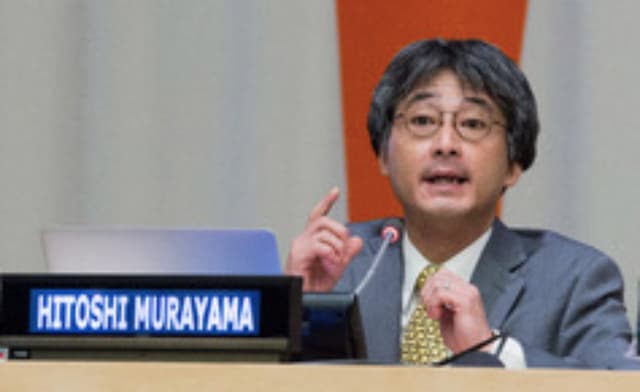At United Nations, Kavli IPMU Director Speaks of the Peacemaking Power of Science
by Kelen Tuttle
At a United Nations event highlighting the role of science in bridging nations, Hitoshi Murayama addresses the critical importance of international science endeavors toward increasing peace and development around the world.

The Author
The Researcher
Disparate nations can move beyond their differences and find peace through a shared quest for scientific knowledge, Hitoshi Murayama, the director of the Kavli Institute for the Physics and Mathematics of the Universe, said today at a celebration organized by the United Nations Economic and Social Council (ECOSOC) and the European Organization for Nuclear Research (CERN).
“I firmly believe that basic scientific research is a true peacemaker for humankind,” he said in his keynote address. “The awe of the beautiful universe makes differences in cultures, languages, colors, genders, religions and ideologies simply disappear.”
“I firmly believe that basic scientific research is a true peacemaker for humankind,” he said in his keynote address. “The awe of the beautiful universe makes differences in cultures, languages, colors, genders, religions and ideologies simply disappear.”
Held at UN Headquarters in New York, the event gathered eminent politicians and scientists including Nobel Peace Prize winner and former UN Secretary-General Kofi Annan, Nobel Physics Prize Laureate and former CERN Director-General Carlo Rubbia, and South African Minister for Science and Technology Naledi Pandor. The celebration, which coincides with CERN’s 60th anniversary year, highlighted the role that science plays in peaceful collaboration, innovation and development.
“CERN embodies this idea that basic science unifies people from all nations,” Murayama said. “Thousands of people from friendly or warring nations come to CERN and build amazing scientific instruments together.”
Established after World War II, CERN seeks to conduct groundbreaking science research while uniting people from all over the world. Even at the height of the Cold War, CERN brought together scientists from both sides of the iron curtain. Today it continues this tradition by promoting exchanges between all countries, independent of their political relations.
“CERN has a history of uniting people in quests that have nothing to do with power but everything with knowledge,” Murayama said.
In addition to promoting unity and peace, the quest for fundamental knowledge is also key to our future quality of life, Murayama continued.

Raising the standard of living requires bringing scientific knowledge to all people, he said. “Everybody needs to understand that resources available on our planet are finite and not very much for billions of us. And this development, based on curiosity for Mother Nature, can start with just looking up the night sky, and sharing our awe of the beautiful universe.”
As director of Kavli IPMU, Murayama plays an active role in both sharing that awe and unifying people of all nations. Located in Kashiwa, Japan, Kavli IPMU acts as a mini United Nations of its own, uniting scientists from Russia and Ukraine, England and Argentina, India and China, in the common goal of unraveling the mysteries of the universe: How did the Universe begin? What is it made of? What is its fate? What are its basic laws? Why do we exist in it?
“These questions resonate well with scientists from all cultures,” Murayama said. The “laws of physics, and [the] mathematics that describe these laws, are… applicable to the entire planet Earth.”
Through Kavli IPMU, CERN, and the many other international science endeavors to come, Murayama looks forward to a more peaceful, united world.
“I’m eager to make sure that science contributes to peace and development of the entire planet,” he said, and added, “Personally, I’d love to see the US and Japan host similar international organizations for basic research, where people from all around the world come and work together.”
Murayama’s full remarks are available here. A video of the event, including Murayama’s speech, can be found on UN Web TV, and more information on the celebration can be found on the ECOSOC website. In addition, a Q&A with Murayama further exploring the themes of science for peace and development is available here.
Kavli IPMU is an international research institute with English as its official language. The goal of the institute is to discover the fundamental laws of nature and to understand the Universe from the synergistic perspectives of mathematics, astronomy, and theoretical and experimental physics. The Institute for the Physics and Mathematics of the Universe (IPMU) was established in October 2007 under the World Premier International Research Center Initiative (WPI) of the Ministry of Education, Sports, Science and Technology in Japan with the University of Tokyo as the host institution. IPMU was designated as the first research institute within Todai Institutes for Advanced Study (TODIAS) in January 2011. It received an endowment from The Kavli Foundation and was renamed the “Kavli Institute for the Physics and Mathematics of the Universe” in April 2012. Kavli IPMU is located on the Kashiwa campus of the University of Tokyo, and more than half of its full-time scientific members come from outside Japan.
CERN, the European Organization for Nuclear Research, is the world’s leading laboratory for particle physics where it straddles the border between France and Switzerland. Since its establishment in 1954, the various outstanding research results in the field of particle physics have been achieved in CERN. For example, in 1983, Carlo Rubbia and Simon van der Meer discovered the weak boson which carriers the weak force. In 2012, Higgs boson was discovered by the ATLAS and CMS experiments. Today, more than 10,000 scientists of almost 100 nationalities engage in research activities in CERN.